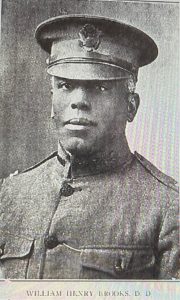William Henry Brooks
Clergyman / WW I Military Officer / Civil Rights Leader
September 6, 1859 – 1923
William Henry Brooks was an eminent clergyman of the Methodist Episcopal Church. He was born in Calvert County, Maryland on September 6, 1859, before the Civil War and emancipation in Maryland. According to the 1870 census, John and Sarah Brooks were his parents and he had three brothers and a sister at home. His education would have started in a one-room schoolhouse and gone no further than the seventh grade. Calvert County schools only permitted Blacks to attend school until the seventh grade in the 1870’s. Brooks went on to Baltimore for further education at Morgan College, then to Washington, DC to Howard University, and then to Union Theological Seminary in New York City.

He served as a Captain and a chaplain in the National Guard.
Dr. Brooks became the pastor of St. Marks United Methodist Church in New York City in 1897 and served in that role until 1923. His church achieved many firsts for an African American congregation. It was a large church and the first built costing more than half a million dollars. Several of the church’s pastors were actively involved in community service, including Dr. Brooks. He was considered the City’s most politically active African American minister. He was selected for many important positions, such as serving as a delegate for the Foreign Missionary Board of the Methodist Episcopal church at the World Missionary Conference in Edinburgh, Scotland.
Dr. Brooks worked with the founders of the NAACP, including Mary White Ovington, WEB DeBois, and others in the initial meetings in forming the NAACP in January and February 1909. He also worked on a committee to improve industrial conditions of African Americans in the City that would merge with others to become the National Urban League.
William Henry Brooks’ story is a remarkable one. Born and raised in Calvert County, he went on to an education and lifetime of achievements hardly imaginable for a man born in such common circumstances.
Sources for this story include:
Men of Maryland – by George F. Bragg – 1914
Archives of the City of New York
Denver Statesman Newspaper Archives
United States Federal Census
Authors: Michael Kent and Hugh Davies
Additional Resources